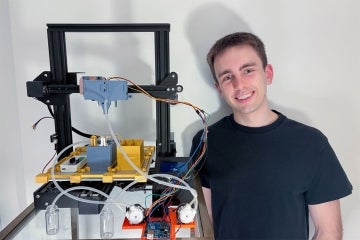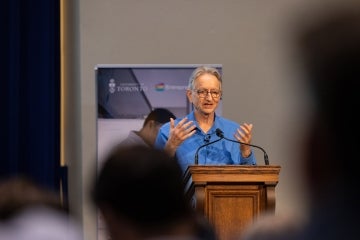
Celebrating 90 Years of Insulin
Published: November 2, 2011
Ninety years after Frederick Banting, Charles Best, John Macleod and Bertram Collip uncovered the role of insulin in diabetes, the legacy of their ground-breaking discovery has a place to call home. A new exhibit at MaRS Discovery called Insulin: Toronto’s Gift to the World lets anyone walk through a day in the life of the discovery and lives of the famous University of Toronto scientists. The exhibit is a joint effort of the Faculty of Medicine, the MaRS Discovery commercialization initiative and the University Health Network, a group of U of T teaching hospitals. (Enjoy some Toronto Star photos of the exhibit.)
“The exhibit is framed by Banting’s desk on one side and his lab bench on the other side,” said Patricia Brubaker, a professor in the Department of Physiology who worked with members of the Faculty of Medicine, a historian and a design team to create the exhibit. “The historian in the team, Chris Rutty, found some old archival footage of Dr. Banting that he had digitized. We also have the original glucometer that was used by Banting and Best. If you look at the display that we have, you can see a reproduction of a painting of Banting and Best working in the laboratory, and prominent in this is the glucometer . So you look at the painting of Banting and Best working in the lab and then you look at the lab bench below the painting, you can see the same glucometer, as well as other items they had used.
“There are also several letters included in the display from grateful patients, although there is reportedly one additional letter that is not in the display, with an envelope that was addressed ‘to the doctor that discovered insulin, Toronto, Canada’ and it managed to find its way to Banting – this really indicates how well known Dr. Banting was as a result of the discovery of insulin.”
Professor Gary Lewis, director of the Banting and Best Diabetes Centre, home to advancing diabetes research at U of T, says the exhibit is a welcome addition to the center’s work and is long overdue. (Watch CBC's video about Banting and the creation of the exhibit.)
“It’s been kind of embarrassing that we haven’t had a museum onsite for the last 90 years,” said Lewis. It’s long overdue. We have a lot of visitors and many of them ask us and we haven’t had anything to show them. So the exhibit solidifies this history and allows us to show it off. It’s a very important part of what this place is about.”
Michael Bliss, emeritus professor and author of the book The Discovery of Insulin, says the discovery wasn’t without its challenges.
“The research team was very volatile. I give an almost blow-by-blow talk about the fights they had in the lab in the book, and I say that what really happened is that these young men -- who were under pressure and never really much liked each other-- were like Canadian hockey players. This was really too bad because it clouded things for many years. As with all human endeavours, humans aren’t perfect and the insulin team was less than perfect.”
Brubaker says the goal of the exhibit was not only to commemorate the discovery but also to be a place for future learning.
“The vision was to be broader than the University of Toronto. We hope to have high school programs coming here because they teach the history of insulin in classrooms. Doors Open comes to the MaRs building, and in addition, for years the institute, has been getting phone calls from people with diabetes who say, we know it was discovered here; where can we go to see any displays? This exhibit will be open all year long 24/7.”
In fact, this year’s Gairdner Award winners had the opportunity to tour the exhibit while they were in Toronto for awards celebrations.
Lewis says he hopes the exhibit will lead to more diabetes research activities at the Banting and Best Diabetes Centre.
“We have a lot of strength,ss, for example in islet cell biology: the study of pancreatic cell that makes insulin and what goes wrong with it in diabetes. We’re known for this around the world. Nutrient therapies and sensing is another big area for us, and those and diabetes complications are all areas we hope to build on.”
So what would Banting and Best say about this exhibit if they were alive today? Bliss has an educated guess.
“I would like to think that time would’ve mellowed them and they would be generous in their appreciation of their other colleagues, which they weren’t always during their lifetimes, but 90 years gives you a kind of perspective. But of course if they came back Banting would just be very upset that nobody allowed him to smoke!”



